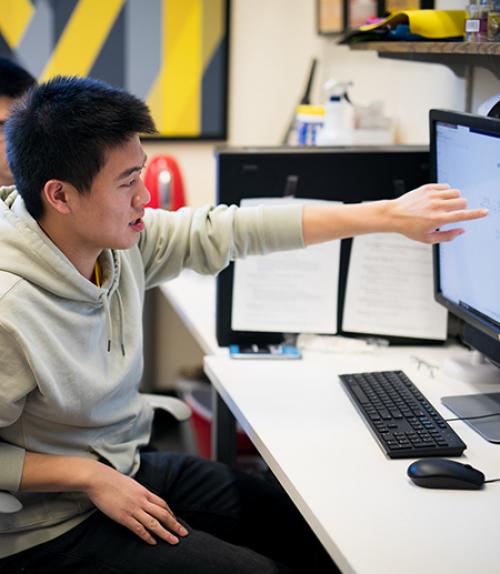Sophomores in the Milstein Program in Technology and Humanity were supposed to be spending the summer of 2020 living in the House on Roosevelt Island in New York City and taking a special set of classes at Cornell Tech.
Instead, because of the COVID-19 pandemic, that program has moved online, and although students and faculty are disappointed about not being together in person, they’re enthusiastic and hopeful about the opportunities this Plan B offers for the creative use of technology.
“I think the world has gone upside down for all of us, for some more than others,” said Tapan Parikh, a professor at Cornell Tech and the NYC co-director of the Milstein Program. “At some level, I want the tenor of this summer to be of excitement, but I know this is a really rough time for everybody.”
The Milstein Program includes 25 students from each class, who apply either as prospective first-year students or in the spring semester of their first year. They pursue traditional majors in the College of Arts and Sciences, but also take a multidisciplinary curriculum providing them with proficiency in computer science and spend two summers at Cornell Tech. The aim is to cultivate innovative and creative leaders who are both tech-savvy and steeped in humanistic values.
The program was created in 2017 with a $20 million gift from Howard Milstein ’73, Abby Milstein and Michael Milstein ’11.
"The class of 2022 is the inaugural class in the Milstein Program, so this would have been the first group of Cornell undergraduates at Cornell Tech, in a pioneering experiment,” said Amy Villarejo, professor of performing and media arts and director of the Milstein program. “It’s all the more so with the remote session, which will give these students quite a different opportunity to think deeply about technology and place and to explore remote and virtual connections.”
This year, the revised summer program has been extended from six to 10 weeks and will include two new workshops – one on sound and color led by Tao Leigh Goffe, assistant professor in Africana studies and feminist, gender, and sexuality studies and another led by Bryan Yee, a multimedia augmented reality/virtual reality producer in New York City. Current Cornell Tech students are also on the teaching team
“This will be an invitation for you all to think synaesthetically,” Goffe told students during an April 29 Zoom call. “What if we crisscrossed the senses and considered technology as a way to create a digital sensorium, a museum we could create online?”
Yee will help students learn and use technology to showcase their work online, share it with others and allow viewers to interact with it in real time using augmented or virtual reality.
“In the period of this quarantine lockdown, we’re all spending so much time online, maybe we can think of a better way to do it using these technologies,” Parikh said. “Our main goal is to equip students with some tools conceptually and technologically so they have a way to express themselves on multiple platforms.”
These two new workshops will take the place of a hands-on prototyping workshop and some of the in-person community service work that was going to take place with residents of Roosevelt Island.
Students will also take part in a workshop with Parikh focused on revolutionary technologies; a listening and oral history workshop by Khadijah Abdurahman, a visiting researcher at Cornell Tech; and a summer talk series with researchers and creators.
Milstein program workshops will take place in the evenings from Monday through Friday, allowing students with summer jobs or internships to keep those commitments.
Students will begin their online workshops June 1 and continue through the middle of August.
“As Arundhati Roy has beautifully articulated, the Pandemic is a Portal,” Parikh wrote in a note to students. “Our goal for the summer is to help you navigate this portal: by providing you with intellectual frameworks and tools that can help you understand and make sense of what is going on, preserve what is worth preserving, and jettisoning that which deserves to be lost.”




